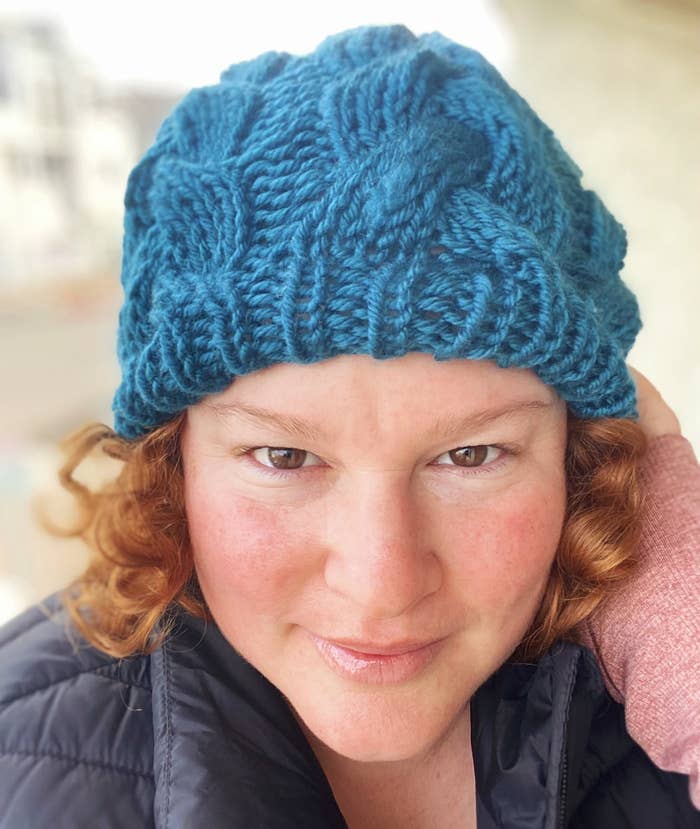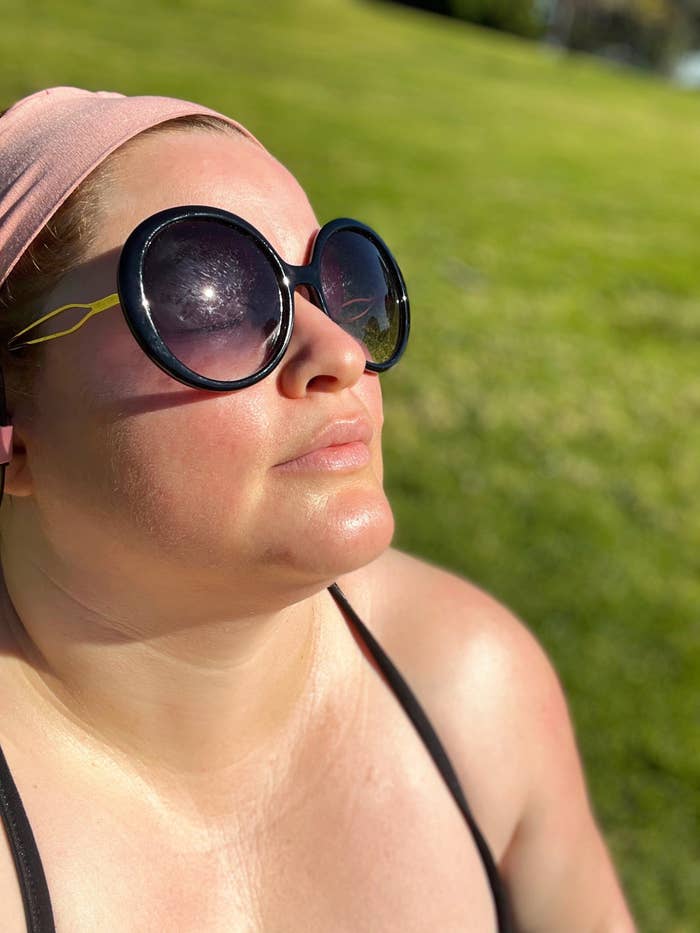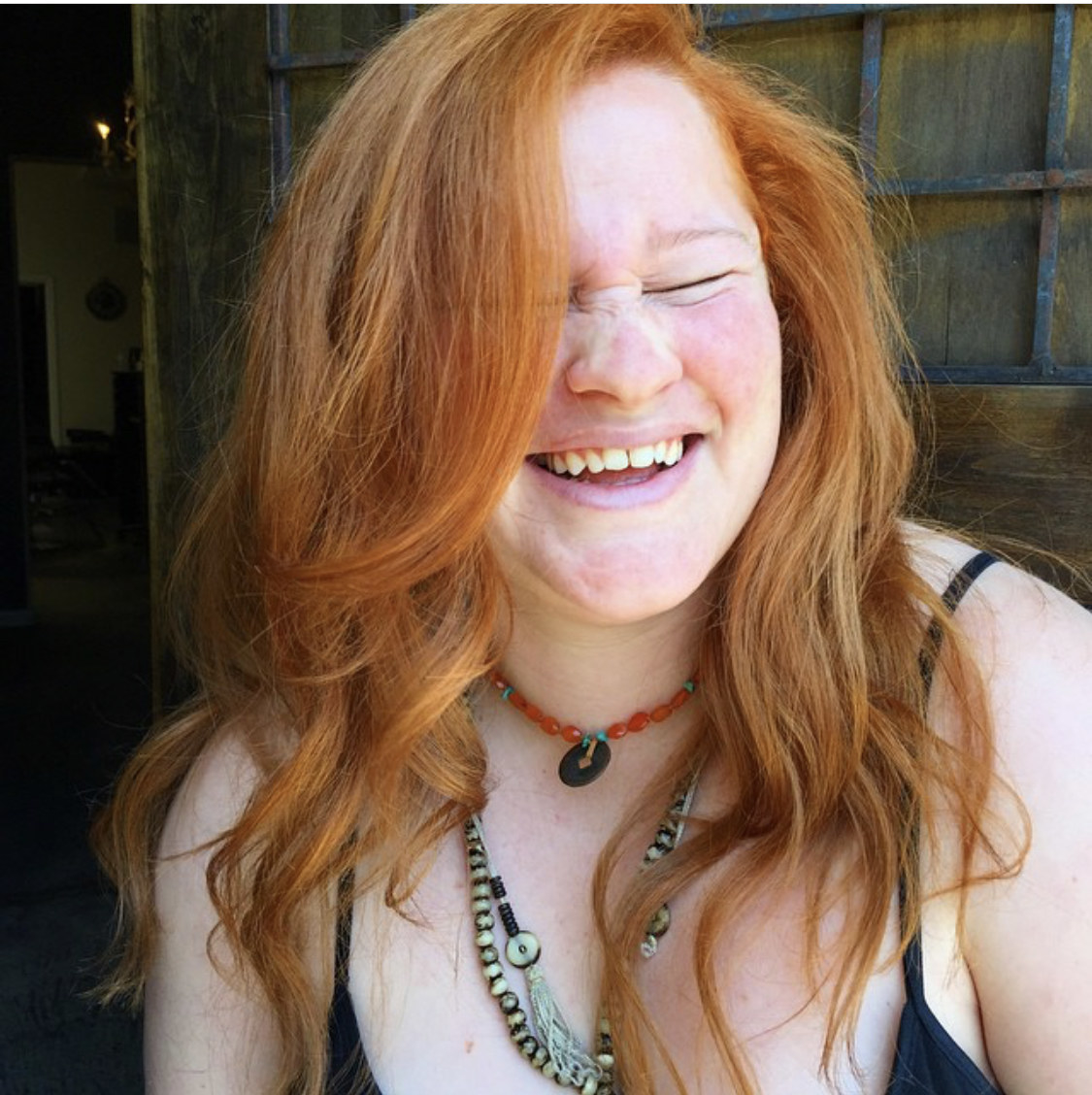A woman named Erica Jacobs has generated important conversations about fatphobia and thin privilege on TikTok after sharing a recent experience she had at work.

Before she begins her story, Erica says, "I am not sharing this story to tattle on anyone. I am not hurt by this anymore. I have already processed it, so I do not need the 'I can't believe they did that — I can't believe they said that!'"

She then continues in her TikTok, "I just started teaching at a new yoga studio about two months ago, and one of the people who work there approached me behind the front desk and asked me a question. They prefaced by saying, 'Hey, can I ask you a personal question?' I am totally game for personal questions always, so I said, 'Sure.'"

"This person proceeded to tell me that they are a holistic nutritionist...and already I was like, 'Fuck, here we go...' [She said] one of their clients has already lost 70 pounds, to which I replied, 'Oh, OK' because I don't congratulate weight loss. I think that's very creepy and weird to do in our culture, so I haven't done it in years. She was a little taken aback by that and then said, 'And she's kept it off!' And I said, 'Oh, OK.' Like, get to the point, you know? Then she said, 'But she's been keeping it off — without my help! She's keeping it off on her own!' I said, 'OK.'"

"Then they said, 'So, I know you teach yoga and sculpt, so obviously you're into health' — I did note the pause — 'and I'm just curious if that's something you want to learn more about and take part in?' And without missing a beat, I have never heard this come out of my mouth in my entire life, I said to this person, 'Thank you so much for asking. I'm actually not interested in weight loss.' To which they replied, 'OH. OH....OK.' Like someone shit on the floor."
"I was a little bothered by it, I was a little hurt. But also I'm acutely aware of the waters we swim in — I know that fatphobia lives in all of us the way white supremacy makes room for everyone at the table no matter what your race is. Fatphobia makes room for everyone, no matter size, shape, weight, race, whatever. So I processed it with people that I love and trust and are safe. Got past it. Great..."
"The next week, the same person approaches me behind the front desk and says, 'Hey, I hope you're not offended by what I'm about to say...' Which that would be your cue to not say anything at all if you're going to start a sentence that way, but whatever. They said, 'I have never met anyone who is more comfortable in their skin.' And I said, 'What makes you think that I'm comfortable in my skin?' They were stumbling over their words and they said, 'Well, when someone is your size...um, I've just never met anyone who is your size that's not interested in losing weight.'"

"I responded by saying, 'So, what you're telling me is that you comfort people and console thin people and reassure them that despite what they see in the mirror and what their perception of their body is, they do not look like me or people that are bigger than me?' This person didn't know what to say — which I wouldn't either because these are things we don't talk to each other about out there in the world — and I said that in our industry, specifically in this company, in this culture, we have a serious problem with fatphobia and assuming that people always want to lose weight."

"Reassuring people who are thin that they are indeed not fat is extremely hurtful and harmful to where we ultimately want to go and I called out my thin privilege and they didn't know what that was. So, I explained all the ways that I experience thin privilege. I can fit on a plane, I never have to worry about chairs wherever I go, nobody stares at me in restaurants, or ogles at my grocery cart when I'm shopping. I can walk into Target and Lululemon and buy what they have there. I can fit into straight-size clothing — so much thin privilege. Yet, in my particular industry, and in other parts of our culture, I am not an acceptable body size."
"I've been wanting to share this because I think, for me, when I chose not to take it so personally — and it did hurt my feelings — I was able to step outside of the situation and hover above it and be like, 'OK, I feel like we could engage in these conversations with each other and have beautiful learning moments when we don't take everything that people say to us to heart.' And the other thought I had was, 'I wonder if this is how Black people feel when white women feel emboldened and just entitled to start spouting off and share their opinions and make suggestions and unsolicited nonsense...'"
BuzzFeed spoke to Erica, who has been a fitness instructor for over 15 years. "I stopped congratulating people on weight loss in 2012 when I began my eating disorder recovery journey. I’ve learned that weight loss in and of itself is a neutral, often accidental occurrence and not a guaranteed outcome of engaging in healthy behaviors, nor is it an indication of health. I’m not certain that congratulating weight loss is detrimental to an individual, but I do believe it hinders our collective ability to address and dismantle fatphobia."
When Erica was asked about losing weight, she said she made a conscious decision to remove herself from the question immediately. "I knew where it was coming from, I knew where it was going, and I knew that I am a part of the reason these situations happen in the first place."
She used a metaphor to further explain: "It's like being in a swimming pool, except instead of chlorine, the pool is infused with white supremacy, systemic racism, fatphobia, ableism, sexism, transphobia, misogyny…the list goes on. There’s enough room for all of us in that pool — in fact, we’re born in it. So, if I've been in the pool my whole life and this woman asking me if I want to lose weight has been in the pool her whole life, then her question is less personally directed at me and more symptomatic of being in the pool for so damn long. Me telling her I’m not interested in weight loss is my way of finding the ladder to exit the pool without condemning another swimmer or taking it personally. I’m still at the pool party and I still take dips on the daily, but the work is recognizing when I’m in the pool and making active choices to get out in those little moments."
Erica is still surprised she was able to tell that woman she wasn't interested in losing weight. "Here’s the thing — as long as I live in a fatphobic society (especially living in Los Angeles), work in an industry rooted in diet culture, and continue not meeting the Western ideal standard of beauty with thinness, I will always be interested in weight loss; how could I not be? But I’m not interested in allowing anyone to further perpetuate or affirm that desire, and I certainly will not pay someone for it," she said.
"Thin privilege is a real thing, and naming my thin privilege as a fat woman is VITAL in these kinds of discussions. While I can say that weight loss won’t make life any easier or more beautiful for me, the reality is weight loss would make a huge difference in how a larger fat person navigates the world, NOT because their size is bad, unhealthy, or wrong — but because our society is intentional in its exclusion and shame of mid-fat, large-fat, and super-fat bodies."

"I would not have made that TikTok or navigated this experience without the help, guidance, and wisdom of so many fat activists, authors, artists, and speakers, particularly Black educators. Sabrina Strings’ book, Fearing the Black Body, and Sonya Renee Taylor’s The Body Is Not an Apology transformed the way I think about my body, fatness, etc."


